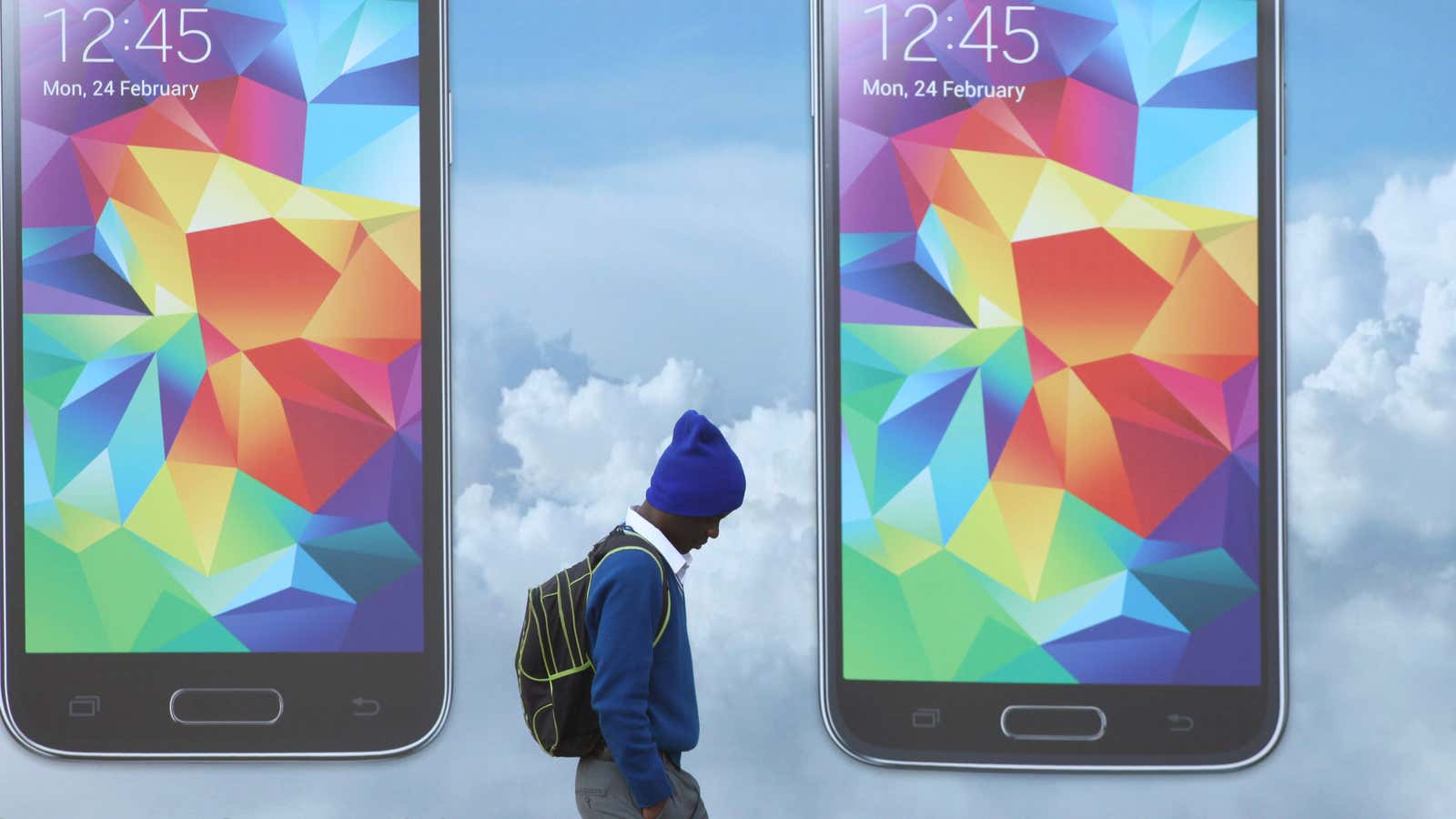South Africans, known for their protest movements, are taking a stand on the high cost of mobile data in the country.
On Wednesday July 5, protestors took a social media blackout, ceasing any tweets, Facebook posts or WhatsApp messages until noon local time on Thursday, July 6. The protest is supposed to take place each Wednesday until data prices fall.
Most South Africans access the internet via their mobile phones, and while the country has prioritized data accessibility as a national policy, the default gatekeepers to that access are the country’s large telecom companies. Users’ ability to participate in the digital economy comes down to the the price per gig or meg of data, and with few major players, it’s not a competitive market, so prices are relatively high, relative to South Africans’ income.
With the country’s median monthly salary estimated at approximately 3,897 rand (about $290), paying more than $4 for a data bundle that is barely enough to send a story to Snapchat is asking a lot. It’s made worse by out-of-bundle rates, which are nearly double.
The 26.8 million South African internet users spend about 1% of their income on one 500MB mobile data bundle, according to a 2015 study by the International Telecommunications Union (pdf published in 2016). In comparison, users in the US spend 0.36% of their income on the same amount of data, according to the union. South Africa’s costs are on par with countries in a similar income range, like Thailand, where users spend 1.21% of their salaries, and Serbia where users spend 1.32% of their salary. Still, as most South Africans rely on prepaid data bundles rather than unlimited contracts, high data costs have proven a galvanizing issue.
The social media blackout was meant to give a voice to ordinary consumers, demonstrating their power not by marches or fiery blockades, but with online silence. By the end of the blackout on Thursday, though, it was hard to quantify the success of the campaign through its various hashtags #SocialMediaBlackout, #BlackOutWednesday, and #DataMustFall.
The real impact of the campaign will be felt once data prices become more affordable, says Ntsiki Mazwai, an entrepreneur and artist with over 85,000 Twitter followers and one of the campaign’s most vocal proponents. South Africans may be more accustomed to struggle songs and marches, but Mazwai says this protest is all about math—with less people going online, they’ll need to buy less data, and so telecommunications companies will lose out.
The #DataMustFall movement first gained momentum in September last year when the popular DJ Thabo “Tbo Touch” Molefe became the movement’s de facto ambassador. Molefe had just moved from a prime-time spot at the public broadcaster to online radio. His campaign made it all the way to parliament, where the DJ made his case to a telecommunications committee.
“Data is as essential as food‚ shelter and clothing,” he said, asking providers to halve their costs. This time around, Molefe seems not to have joined the campaign after he scored a deal with Africa’s largest telco MTN—much to the anger of some his social media followers. Molefe did not respond to Quartz’s request for comment.
MTN and Vodacom have since lowered their prices, but critics say the deals make little difference to consumers. MTN told South Africa’s parliament that better national digital infrastructure would in theory help bring down data costs. MTN has not yet responded to a request for comment.
Vodacom has the highest number of South African subscribers and argue that they have consistently lowered their prices, even before the protests started. The telco told Quartz that it has created a personalized service that has contributed to a 16% price decrease last year, and a 44% decrease over the last three years. Critics, however, argue that given how fast Vodacom’s data-driven revenue has grown, the prices should have dropped sooner and faster.
The South African government has promised to look into the high cost of data as a matter of national urgency, but it won’t be a quick fix. The communications ministry has asked the Independent Communications Authority of South Africa to review pricing, but the Internet Services Providers Association says the body has been “dithering” with this issue since March last year. The Competition Commission, a state regulator tasked with ensuring the economy remains competitive, has also launched an investigation into pricing in the industry.
“I feel like people are expecting someone to save them from high data costs,” says Mazwai. For her part, she’s taken her money elsewhere, to the service provider Afrihost, a fairly young company that is branching out from website hosting and DSL connections to mobile (using MTN’s cellphone towers). If rates prove as uncompetitive as the established players, she says, she’ll move again.
This story has been updated.
